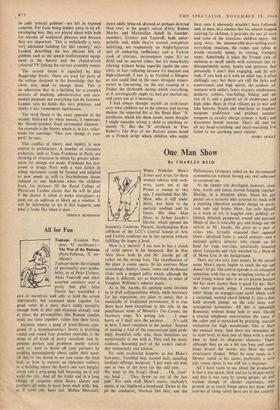One Man Show
By CHARLES REID
Maw is a 'natural.' I am sure he has a clutch of valid operas in his knapsack. But in One Man Show both he and Mr. Jacobs get off rather on the wrong foot. The classification of the piece is comic opera. In his overture Maw accordingly deploys 'comic' tunes and rhythmical tricks with a dogged jollity which, although the idiom is different, are as dispiriting as some of Vaughan Williams's scherzo pages.
As to Mr. Jacobs, his opening scene involves us in drab colloquialisms which, while necessary for his exposition, are alien to music that is essentially of traditional provenance. It is true there have been exceptions to this rule. In the penultimate scene of Menotti's The Consul, the Secretary sings, 'It's getting late . . . I must hurry or I shall miss the pictures . . . It's cold in here. I must complain to the janitor.' Instead of making a fool of the concomitant (and prob- ingly beautiful) cello solo, these banalities are mysteriously at one with it. They and the music coalesce, becoming part of the scede's end-of- day melancholy and tension.
No such coalescing happens in Joe Blake's bed-sitter. Tumbled bed, tousled hair, squalling landlady offstage, hangover. `I just went out with one or two of the boys for the odd pint . . . We went to the King's Head . . . Oh, God! my head . . . They threw us out of the last pub.' For such stuff Maw's music, anybody's music, is too highbred a handmaid. Down in the pit the conductor, Norman Del Mar, and the
Philomusica. Orchestra toiled on the instrumental commentaries without having any real substance to comment on. •
As the slender tale developed, however, situa- tion, words and music started hanging together. Having, in a drunken whim, blued his paY packet on a tattooist who covered his back with a puzzling (therefore modish) design in nettle- rash reds and bruise blues, Joe sells himself as a work of art, is haggled over, publicly ex- hibited, debated, pampered, wooed and pursued. Much of this is tolerably gay and brings out the satirist in Mr. Jacobs. He gives us a pair of critics who lyrically expound their opposed tenets--idealised form v. social content—and a national gallery director who stands on his head for yoga exercises, ecstatically moaning about Leonardo and slyly watched by a blow-up of Mona Lisa in the background.
There are two acts, four scenes. In the second scene Maw's music begins to catch the ear and doesn't let go. The central episode is an attempted seduction, with Joe as the wriggling victim of an avid young widow who is an art patron because she has more money than is good for her. Here the score spreads wings. I remember among other .things an arpeggio-type motif which trails a sustained, scented chord behind it; also a tine, bold seventh plunge on the solo horn over syncopated harmonies. All this is splendidlY Romantic without being lush or stale. During a crucial telephone conversation the voice at the other end is mimicked by prattling, staccato recitatives for high woodwinds.. This is Maw the musical tease. And there are ensembles up to octet level, at least one of them with a strong tune to bind its disparate elements. These, although they go on a bit too long and some times drown the words, are Maw the con' structionist thinker. What he now needs is a libretto tuned to his talent, preferably a se" job; comic opera is too stiff for a beginner.
All I have room to say about the production is that it was quick, slick and (as to design) wittY. and that it was sung by young people, all well trained though of slender experience, who proved, as so much fringe opera has done, what reserves of rising talent there are in this country.


































 Previous page
Previous page